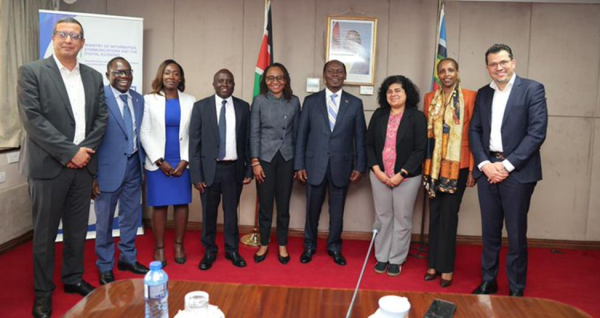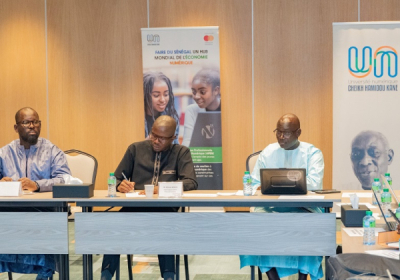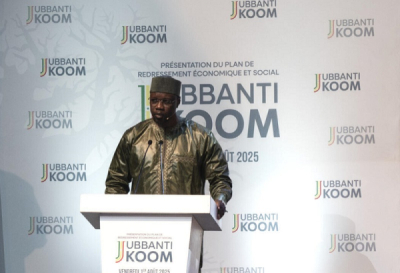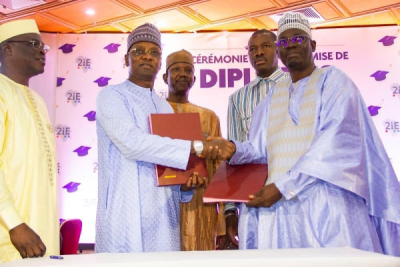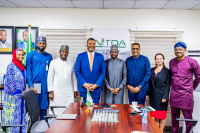
Tech (1115)
• BCEAO to launch instant payment system (PI-SPI) for WAEMU in September.
• Enables real-time transfers across banks, microfinance, and mobile money.
• Supports rising digital use; e-money accounts hit 209M in 2023.
The Central Bank of West African States (BCEAO) announced on Friday that its Interoperable Instant Payment System Platform (PI-SPI) is scheduled to launch at the end of September. The new regional infrastructure is designed to facilitate real-time money transfers within the WAEMU area.
The system will allow clients of banks, microfinance institutions, and electronic money operators to make instant, secure, and interoperable transfers regardless of the account type or channel used. Pilot tests have been underway with a sample of selected clients since June 5 to assess the system's performance under real conditions.
This unified payment system was established to meet the growing demand for faster, safer, and more accessible financial services in West Africa. According to a BCEAO report, the number of active electronic money accounts in the WAEMU area rose from 157 million to 209 million between 2022 and 2023, an increase of 32.74%. These services now contribute to 56% of the region’s overall financial inclusion rate, which was 72.3% at the end of 2023.
With PI-SPI, the central bank is advancing its payment system modernization plan and facilitating the interconnection of various financial players in the region. The goal is to build a more integrated ecosystem that can support the growth of fintechs, streamline electronic flows, and reduce the region's dependence on cash.
Ultimately, the system could encourage wider adoption of digital payment methods for daily use and expand access to financial services in areas underserved by traditional networks. By connecting financial sector players, this initiative paves the way for unprecedented regional interconnection.
Samira Njoya
The partnership talks to Kenya’s biggest digital ambitions — secure infrastructure, AI-powered governance, globally competitive talent, and sovereign data control. By collaborating with a global tech heavyweight like Microsoft, Kenya can de-risk its digital transformation journey while unlocking new economic opportunities for its citizens.
On July 31, a high-level meeting was convened between senior government officials and a Microsoft delegation to explore strategic areas of collaboration aimed at accelerating Kenya’s digital transformation. The discussions focused on enhancing cybersecurity, fortifying the security of public infrastructure and citizen data, and rolling out Digital Hubs across the country to foster innovation and connectivity.
In attendance from the government were Principal Secretaries Stephen Isaboke (Broadcasting & Telecommunications) and Eng. John Tanui (ICT & Digital Economy), along with Emmanuel Kata, Secretary of ICT and Security Audit Control. Representing Microsoft were Rashida Hodge, Corporate Vice President of Data and AI Customer Success; Aarti Borkar, Corporate Vice President of Security, Customer Success & Incident Response; and Phyllis Migwi, Country Manager, Microsoft Kenya, among other senior executives.
A key highlight of the meeting was the integration of Artificial Intelligence (AI) across government operations. Both parties emphasized the importance of mainstreaming AI to improve service delivery, strengthen policymaking, and build institutional resilience. This initiative is expected to position Kenya as a leader in AI adoption within the public sector.
The dialogue also delved into strengthening Data Governance and Compliance frameworks. The government and Microsoft explored ways to promote trusted cloud partnerships while ensuring sovereign control over national data assets. This approach aims to reinforce public trust and safeguard sensitive information in an increasingly digital world.
The high-level engagements with Microsoft come at a pivotal moment in Kenya’s digital journey. According to the latest GSMA report, Driving Digital Transformation of the Economy in Kenya, the digital economy is projected to contribute KSh 662 billion to GDP by 2028, up from KSh 421 billion in 2022. Realising this potential requires rapid expansion of secure digital infrastructure, cloud services, AI-enabled public service delivery, and trusted data governance — all areas central to the discussions. By partnering with global technology leaders, Kenya aims to not only safeguard its digital transition but also unlock new economic value, accelerate job creation, and cement its position as a regional hub for innovation.
Hikmatu Bilali
• Senegal reviewed progress of the Force-N digital jobs program ahead of its 2026 end.
• Backed by Mastercard Foundation, it targets 70,000 jobs and 1,000 startups.
• To date: 2,548 trained, 13,554 linked to jobs, 7 startups created.
Senegal’s Minister of Higher Education, Research and Innovation, Dr. Abdourahmane Diouf, chaired the first Steering Committee meeting for the Force-N program on Tuesday, July 29, in Diamniadio. The program was developed by the Cheikh Hamidou Kane Digital University (UNCHK) in partnership with the Mastercard Foundation.
The committee, which includes key institutional stakeholders from the presidency, prime minister's office, and various ministries and partners, reviewed the program's progress. It also defined its strategic direction and worked to strengthen its governance and nationwide deployment.
Launched in 2022 as a five-year initiative, Force-N aims to create 70,000 jobs for young people, support 10,000 entrepreneurs, and launch 1,000 startups in the digital sector. The program focuses on five key pillars: training, professional integration, entrepreneurship, digitalization of public administration, and the promotion of artificial intelligence.
Although it predates the Technological New Deal, Force-N aligns with its goals and those of the 2050 Agenda. Both initiatives seek to establish Senegal as a digital hub by promoting STEM skills, youth employment, and innovative entrepreneurship.
With one year remaining before its scheduled conclusion in 2026, the program has shown modest results. It has trained 2,548 young people in entrepreneurship, connected 13,554 to job opportunities, and created seven startups. This first steering committee meeting is expected to intensify action, strengthen partnerships, accelerate the program's rollout across the country, and adopt more agile mechanisms to meet its ambitious targets.
These measures are intended to maximize Force-N’s impact and reinforce Senegal’s digital transformation efforts.
Samira Njoya
• Senegal launches "Jubbanti-Koom" to restore fiscal stability by taxing digital sectors like online betting, mobile money, and digital content.
• Key reforms include taxing gross gaming revenue and player winnings, expected to generate CFA 400 billion annually.
• Plan also focuses on digitizing procurement, expanding digital ID, and formalizing the informal digital economy.
In a challenging macroeconomic context, Senegal’s Prime Minister Ousmane Sonko unveiled the country’s Economic and Social Recovery Plan, a cornerstone of its Vision 2050 agenda. Named Jubbanti-Koom, the plan aims to restore fiscal sustainability while funding more inclusive development. To achieve this, the government is betting on digital technology as a strategic lever for both growth and increased public revenue.
The plan is built around several fiscal measures targeting high-growth digital segments, including online gaming, mobile money, digital advertising, video on demand, and income from influencers. The government intends to tap into these often under-regulated niches to create new fiscal space.
Regulating and Taxing Online Betting
One of the plan’s key measures is a tax on the gross gaming revenue of online sports betting and games of chance, which are primarily operated by foreign companies. The government also plans to tax player winnings. This reform is expected to generate approximately 400 billion CFA francs in annual tax revenue. It also aims to protect Senegalese consumers, especially young people, from the risks of a poorly regulated environment.
The reform includes a stronger push to digitize public procurement. This is expected to streamline public spending and improve the traceability of financial flows. Online advertising, video on demand services, and income from digital content will now be incorporated into the tax base. Another strategic focus is optimizing taxation on mobile money, which has become a key money transfer channel for millions of Senegalese.
Structural Transformation of the Digital Tax Framework
Beyond immediate measures, the plan includes a technical component to prepare the economy for the rise of new digital services. This involves accelerating digital identification, which is crucial for the reforms’ success, and deploying reliable technology infrastructure, as outlined in the Technological New Deal.
In a country where digital activities account for a significant portion of the informal economy, these measures are expected to reduce tax evasion, provide better oversight of digital actors, and create a more formal and productive ecosystem. Ultimately, Senegal hopes to turn the digital sector into a genuine engine of growth and fiscal equity.
Samira Njoya
-
Many African countries still lack standardized digital address systems.
-
This gap limits access to essential services, especially in rural areas.
-
Governments are launching reforms to support digital inclusion and growth.
Across Africa, the absence of reliable digital address systems remains a major barrier to accessing essential services and advancing economic development. As digital economies grow rapidly, several countries are stepping up efforts to map their territories and build more connected and inclusive governance systems.
In many regions, assigning precise and standardized digital addresses to homes, businesses, and infrastructure is still a structural challenge. Without these systems, citizens face hurdles in everyday services such as package delivery, healthcare, emergency response, and administrative processes.
Large parts of rural Africa, as well as informal urban areas, remain without formal addresses. This weakens logistical networks, disrupts territorial planning, and limits delivery of basic services. For millions, not having an address means being left out of economic systems and public support.
Governments launch national reforms to modernize address systems
Several African countries have begun tackling the issue. Nigeria, for instance, launched a national program to overhaul its address system using GPS technology, mobile apps, and centralized digital databases. The project aims to improve location identification, public service delivery, and support the digital economy’s expansion.
Other countries such as Kenya, South Africa, Rwanda, and Senegal are moving in a similar direction, often through public-private partnerships focused on digitizing physical territory. In Cameroon and Guinea, governments are working with the startup FindMe to pilot digital addressing solutions, particularly to upgrade postal services and improve territorial connectivity.
This growing mobilization follows a broader international push. In 2009, the Universal Postal Union (UPU) issued a resolution urging all member states to implement national addressing systems. This prompted many African governments to see digital addresses as essential infrastructure for public policy, urban development, and digital transition.
A tool to unlock e-commerce, fintech, and modern services
Digital address systems could be a turning point for African economies. They provide a precise geographic framework that supports the rise of services in e-commerce, financial technology, transport, and healthcare.
In online retail, for example, address reliability is key to customer satisfaction. Africa’s e-commerce market is growing fast, with projected revenues surpassing $45 billion by 2028, according to Lithuanian fintech firm Nikulipe. But poor address systems make delivery more complex, expensive, and less dependable, limiting this growth.
A driver of better governance and broader inclusion
Beyond economic benefits, digital addresses also improve public governance. Local governments can plan infrastructure more effectively, manage services like waste collection or emergency response, and respond faster during health or environmental crises.
Address systems also improve access to financial and social services. Having a formal address can make it easier to open a bank account, register a business, or receive public assistance, key steps toward broader social and economic inclusion.
By upgrading their address systems, African countries are laying the foundation for lasting digital transformation. More than just a mapping tool, digital addressing is becoming a strategic asset for organizing territory, streamlining services, and building an inclusive digital economy.
In short, digital address infrastructure is not just a technical fix, it is a vital step toward better governance, deeper integration, and a more forward-looking Africa.
Samira Njoya
-
Chad's ADETIC partners with Burkina Faso’s 2iE to train professionals in digital and emerging technologies.
-
Agreement includes training, intern exchanges, and joint research on digital governance.
-
ENASTIC signs separate protocol with 2iE to boost academic collaboration.
The Chadian Agency for the Development of Information and Communication Technologies (ADETIC) has partnered with the International Institute for Water and Environmental Engineering (2iE), a private training center in Ouagadougou, Burkina Faso. This initiative aims to train Chadian professionals in digital fields and in advanced and emerging technologies.
The framework agreement rests on three main pillars. It includes training Chadian professionals in artificial intelligence and emerging technologies, hosting Burkinabe interns within ADETIC, and developing joint applied research projects. These projects will focus on digital governance, local innovation, and sustainable development. Chad’s National School of ICT (ENASTIC) and 2iE also signed a separate collaboration protocol to facilitate academic exchanges and joint program development.
This initiative unfolds during the official visit by Chadian Minister of Telecommunications, Digital Economy and Digitalization of the Administration, Boukar Michel, to Ouagadougou. The agreement reflects a commitment to building human capital that can support public administration modernization and meet digital economy demands. By partnering with 2iE, Chad aims to accelerate the professional development of its talent, often hindered by a lack of specialized training infrastructure within the country.
This partnership comes as many African countries pursue policies to digitize public services. The success of these reforms largely depends on the availability of local technical expertise. Investing in training qualified professionals is thus a strategic priority for states like Chad, which face both a shortage of specialized human resources and increasing needs in e-government services.
Samira Njoya
-
HAVAÍC’s African Innovation Fund reached \$50M after a second close with $25M from Sanlam and others.
-
The fund backs high-impact African startups; recent investments include SAPay and Sportable.
-
Amid weak VC recovery, HAVAÍC targets scalable tech growth across fintech, healthtech, and more.
South African venture capital firm HAVAÍC announced on Tuesday, July 29, the second close of its African Innovation Fund, which now totals $50 million. This latest phase secured an additional $25 million from Sanlam Multi-Manager and existing investors, including Fireball Capital and the SA SME Fund.
These supports are “testament to our track record for not only delivering leading returns by supporting African-born businesses, but also creating meaningful social and economic change through our investments. Together, we can continue supporting our continent’s dynamic tech entrepreneurs and grow African VC to new heights," said Ian Lessem, managing partner at HAVAÍC.
Launched in August 2024, this third fund targets post-revenue African startups that show high growth potential and measurable impact. The fund recently invested $1 million in SAPay, a South African financial technology firm that digitizes payments in the minibus taxi sector. HAVAÍC also increased its stake in Sportable, a startup developing real-time sports tracking technologies.
A Rebound in African Venture Capital That Remains Fragile
The year 2023 saw a sharp halt in funding for African startups, with a 36% decline and less than $3.2 billion raised overall, down from over $6 billion in 2022, according to Africa: The Big Deal. In 2024, amounts raised remained modest at $2.2 billion, the same sources reported.
HAVAÍC's portfolio includes 22 startups active in 183 countries, with six notable exits. These exits include the sale of RapidDeploy to Motorola Solutions in February 2025 and the merger between hearX and U.S.-based Eargo. HAVAÍC continues to pursue a strategy focused on building globally scalable African tech champions.
Beyond just funding access, the capital raised by HAVAÍC is expected to bolster the African tech ecosystem. It aims to support the scalability of innovative companies in key sectors such as financial technology, agricultural technology, health technology, and education technology. For institutional investors like Sanlam, this move seeks to capture the long-term potential of a developing market by relying on experienced local partners.
The challenge remains substantial. According to the African Private Capital Association, the continent still attracts less than 1% of global venture capital. Initiatives like HAVAÍC's Fund II therefore, act as catalysts to draw both local and international capital towards Africa's most promising companies.
Samira Njoya
-
Senegal and Alibaba Cloud signed a $5M deal to host Dakar 2026 Youth Olympic Games on sovereign cloud infrastructure.
-
Agreement includes local data hosting, training 200 engineers, and post-Games use as national public cloud.
-
Supports Senegal’s digital sovereignty strategy and follows PM Sonko’s June 2025 China visit.
The Senegalese government announced on Monday, July 28, it signed a memorandum of understanding with China’s Alibaba Cloud in Hangzhou. The initiative aims to provide secure, high-performance, and sovereign cloud infrastructure for the Youth Olympic Games, scheduled for Dakar in 2026. It will also establish a lasting digital ecosystem in Senegal.
According to Selina Yuan (photo, center), Vice President of Alibaba Group and President of Alibaba Cloud Intelligence International, this is the first time a world-class cloud technology will support an Olympic event in Africa. She added that Alibaba aims to deliver an efficient, secure, and innovative digital experience for athletes, organizers, and spectators through its proven cloud infrastructure and AI capabilities.
The agreement includes an initial investment of $5 million to deploy Alibaba Cloud’s hybrid Apsara Stack solution. This will allow for local data hosting that complies with international standards. The partnership also covers training 200 cloud engineers, creating a technology center of excellence, and implementing digital services for the Youth Olympic Games, including ticketing, e-transport, and live streaming. After the event, the infrastructure is expected to become a national public cloud to support public and private sector services.
This partnership follows Prime Minister Ousmane Sonko’s official visit to China in June 2025. It aligns with the "New Deal Technologique," Senegal's national strategy to boost digital sovereignty through innovation, local infrastructure, and training. The agreement also marks a new step in strengthening technological ties between Dakar and Beijing.
With this initiative, Senegalese authorities aim to make the Youth Olympic Games a technological springboard and reinforce their digital sovereignty strategy. Developing local expertise through training 1,000 young people via the Alibaba Cloud Academy and establishing robust infrastructure should help Senegal accelerate its digital transformation while promoting innovation and skilled employment.
Samira Njoya
Nigeria and Google are expanding their partnership to accelerate the country’s digital transformation, focusing on artificial intelligence (AI), cybersecurity, and digital education.
On July 25, the National Information Technology Development Agency (NITDA) and Google reaffirmed their commitment to making Nigeria a regional leader in AI and cybersecurity. NITDA Director General Kashifu Inuwa met with Google Vice President of Government Affairs and Public Policy (Cloud), Marcus Jadotte, during a series of strategic meetings in Abuja.
The discussions zeroed in on four key areas: integrating AI into public services, digitising the education system, strengthening cybersecurity frameworks, and driving local innovation. Google pledged to support Nigeria’s push to modernise public institutions by expanding cloud infrastructure and cutting tech costs.
These talks followed Google’s recent announcement of a $37 million investment to boost AI development in Africa. The funding will support research, training, infrastructure, and the design of AI solutions tailored to African contexts. As part of this expansion, Google recently opened an AI community centre in Accra, Ghana, underlining its commitment to long-term presence in sub-Saharan Africa.
The timing of this renewed partnership aligns with Nigeria’s broader digital ambitions. The government is intensifying efforts to build a resilient digital ecosystem, anchored by its “3MTT” (Three Million Technical Talent) programme. The initiative aims to train millions of young Nigerians in future-proof digital skills, with AI as a central pillar.
Google’s collaboration could play a critical role in scaling local talent, boosting innovation, and generating homegrown solutions for Nigeria’s economic and social challenges.
This article was initially published in French by Samira Njoya
Edited in English by Ange Jason Quenum
Many South African SMEs face serious hurdles like lack of financing, limited market access, and skills shortages. These challenges slow their growth in the ICT sector. Samsung is stepping up its support to tackle these problems head-on.
On July 21, Samsung, the South Korean electronics giant, announced a new phase of its Enterprise Equity Investment Program (EEIP). The program runs in partnership with South Africa’s Department of Trade, Industry and Competition (DTIC). This phase targets Black-owned SMEs in information and communications technology, focusing especially on emerging startups and women entrepreneurs.
Nicky Beukes, EEIP project director at Samsung South Africa, said, “This is our way of ensuring that we empower South Africa’s digital future by helping ICT entrepreneurs thrive as we deepen our commitment and collaboration with DTIC[...] As Samsung, we also understand how much entrepreneurship contributes to job creation, community development and how it fosters innovation and drives economic growth.”
Launched in 2019, the program aligns with South Africa’s National Development Plan (NDP) for 2030 and the Black Economic Empowerment policy (B-BBEE). It funds with 280 million rand (about $15.9 million) to address key barriers faced by small businesses: limited capital, a shortage of technical skills, difficult market integration, and digital risks.
For this third phase, Samsung broadens eligibility to include more early-stage startups. It also boosts female participation in technology sectors. This move aims to build a more representative digital ecosystem and unlock innovation potential in traditionally underrepresented groups.
The program offers intensive training, mentoring, management support, and focused grants to help SMEs grow. Recently, several supported SMEs have established themselves in repair services and technology hubs. Through the EEIP, Samsung hopes to drive a resilient and inclusive digital economy in South Africa.
This article was initially published in English by Samira Njoya
Edited in English by Ange Jason Quenum
More...
This partnership brings together two influential players to strengthen Africa’s innovation and startup ecosystems — critical drivers of job creation, digital transformation, and economic growth.
AfriLabs, the pan-African network of innovation hubs, has signed a collaboration agreement with Kenya’s Konza Technopolis Development Authority (KoTDA) to catalyze inclusive technology development, foster entrepreneurship, and expand Africa’s innovation economy. The agreement was announced July 18 and comes ahead of the highly anticipated 10th edition of the AfriLabs Annual Gathering (AAG2025), scheduled to take place in Nairobi from October 7–9.
AfriLabs Executive Director Anna Ekeledo said, “This partnership represents our shared commitment to scaling African innovation through collaborative infrastructure, talent exchange, and knowledge networks. We’re proud to work alongside Konza Technopolis as we expand our mission to empower Africa’s next generation of innovators.”
The collaboration brings together two influential institutions working at the crossroads of innovation policy and sustainable development. Together, AfriLabs and Konza will co-design and implement programs that support startups, enhance ecosystem capacity, facilitate cross-border collaboration, and unlock investment opportunities across the continent.
Konza Technopolis will serve as the Strategic Government Partner for AAG2025 — a flagship event under the new partnership. In this role, KoTDA will mobilize national stakeholders, host thematic exhibitions, and facilitate high-level participation to shape the event’s central theme: “Africa’s Innovation Future: Policy, Partnerships, and Progress.”
The collaboration focuses on developing soft-landing programs, joint ventures, and innovation showcases; supporting IP registration and tech transfer; and conducting joint research in AI, clean tech, health tech, and smart infrastructure. It also includes training bootcamps and knowledge-sharing for innovators and policymakers, linking Konza-based startups to AfriLabs’ Catalytic Africa fund and investor network, facilitating cross-border startup exchanges, and using Konza’s infrastructure as a testbed for smart city and IoT solutions.
With a network spanning 53 African countries, AfriLabs is poised to leverage its extensive reach to deepen impact through this long-term partnership. The collaboration also aligns with Konza’s mission to drive Kenya’s digital transformation through innovation-driven development.
Konza Technopolis, often referred to as Africa’s Silicon Savannah, is a flagship Smart City initiative under Kenya’s Vision 2030—the national blueprint to position Kenya as a newly industrializing, middle-income economy. The city is envisioned to contribute at least 2% to Kenya’s GDP, reinforcing the country’s role as a premier tech and innovation hub on the continent—making it a fitting strategic partner for the 2025 AfriLabs Annual Gathering and broader pan-African innovation efforts.
The partnership benefits a wide range of stakeholders: startups and innovators gain access to funding, mentorship, and real-world test environments; youth and digital professionals benefit from upskilling opportunities and enhanced job readiness; governments and policymakers are supported with research-backed strategies to advance smart cities and digital public infrastructure; and investors and ecosystem enablers gain exposure to a pipeline of more investable and scalable ventures.
Hikmatu Bilali
-
Algeria plans a digital portal and centralized system to monitor public infrastructure projects nationwide.
-
The system will track real-time progress, detect delays and cost overruns, and enhance transparency.
-
Authorities aim to improve public investment performance and tighten control over budgets through digital tools.
Algeria moves to modernize its public works sector by adopting digital technology to boost project management. The Ministry of Public Works and Basic Infrastructure announced plans on July 19 in Algiers to launch a digital portal and centralized system for overseeing infrastructure projects across the country.
Minister Lakhdar Rekhroukh said the system will serve as a real-time dashboard to aid quick decision-making and raise implementation efficiency. He explained that the platform will monitor every project phase at both central and local levels, providing an instant snapshot of work progress.
The two digital tools will help stakeholders spot delays and cost overruns promptly while delivering actionable data to administrators, project engineers, financial controllers, and local officials. This access aims to make project management more efficient and transparent.
This digital move fits a broader government effort to digitize public procurement in Algeria. The infrastructure sector faces issues like chronic delays, unexpected cost hikes, and opaque monitoring—factors that hinder public investment and strain state finances.
Developed by the French Treasury’s National Equipment Fund for Development(CNED), the platform combines performance indicators and automated reports. It links spending directly to actual progress on project sites.
By centralizing and updating information instantly, the system will improve cost control, help meet deadlines, and boost transparency in public fund usage. Officials expect it to lay foundations for stronger investment governance and higher quality infrastructure delivery.
This article was initially published in French by Samira Njoya
Edited in English by Ange Jason Quenum
The Democratic Republic of Congo (DRC) has launched a blockchain-powered platform to combat fake diplomas and speed up slow administrative procedures. The new digital solution, called “e-Diplôme,” aims to secure and digitise the issuance and verification of state diplomas.
The government unveiled the initiative on July 18 during a Council of Ministers meeting in Kinshasa.
“The e-Diplôme platform represents a decisive turning point in the modernisation of the Congolese education system,” said Minister of Communication and Media Patrick Muyaya Katembwe. “This major step towards transparency, modernisation, and digital sovereignty positions the DRC’s education system as a model of governance in Central Africa.”
Accessible at www.schoolap.cd, the platform allows centralised, digital management of academic records. Each diploma will be stored and authenticated using blockchain technology, enabling instant online verification by graduates, employers, universities, and embassies.
The system ensures permanent digital archiving, protecting records from data loss, forgery, and physical damage.
The move comes as the DRC—like many African nations—struggles with rampant diploma fraud. The e-Diplôme platform is part of a wider government push to modernise public administration, strengthen digital sovereignty, and digitise essential public services.
By removing paper documents and manual processing, the system aims to streamline interactions between schools, ministries, and recruiters. It will reduce verification delays, limit human errors, and simplify procedures for graduates.
This article was initially published in French by Samira Njoya
Edited in English by Ange Jason Quenum
In launching the ACTS AI Institute, Africa is making a clear statement: the future of AI on the continent will not be outsourced. It will be developed by Africans, for Africans—rooted in local values, driven by local needs, and shaped through global collaboration.
The African Centre for Technology Studies (ACTS) has launched the ACTS AI Institute (ACAII), an initiative aimed at advancing responsible, African-centered AI research, innovation, and governance. Positioned as a continental hub for ethical and inclusive AI, the Institute seeks to empower local communities, drive sustainable development, and ensure that AI technologies reflect Africa’s unique values and priorities.
For the Executive Director of ACTS, Prof. Tom Peter Migun Ogada, “The Institute builds on the experience and network consolidated over a period of five years, since ACTS started implementing projects related to development and deployment of responsible AI solutions and related policies. This launch is therefore meant to enable us to do what we have been doing better, with a wider mandate across the continent.”
Backed by the AI for Development (AI4D) program—with support from the International Development Research Centre (IDRC), the UK’s Foreign, Commonwealth & Development Office (FCDO), and the Swedish International Development Cooperation Agency (SIDA)—ACAII builds on a foundation laid by the AI4D Scholarship Program. This initiative has already enabled researchers from historically underrepresented communities to design and scale AI solutions tailored to African contexts.
At the heart of the Institute’s mission are five strategic pillars: responsible AI solutions, AI policy and governance, AI and jobs, capacity building, and data science. Through these, ACAII aims to address critical challenges across agriculture, healthcare, education, and climate resilience. For example, the Institute is developing AI-driven weather prediction models and crop yield tools that can assist Africa’s 60% smallholder farmers, as well as telemedicine platforms that expand access to healthcare in remote communities.
The Institute also sees AI as a vehicle for economic inclusion and transformation. By exploring labor market trends and encouraging AI-driven entrepreneurship, ACAII aims to equip young Africans with the tools to create new industries and jobs, rather than be displaced by automation.
This people-first approach is echoed in ACAII’s dedication to education and training. The Institute is actively working with African policymakers, researchers, and educators to develop curricula and training programs that will build long-term human capacity in AI governance, ethics, and development.
To ensure its impact is felt across the continent, ACAII is building a wide coalition of partners—from government and academia to civil society, the private sector, and the media. This ecosystem approach is key to scaling innovations responsibly and ensuring the benefits of AI reach those often left behind by previous waves of technological change.
Despite growing interest in AI, Africa still lags in global AI development. The Oxford Insights Government AI Readiness Index (2022 edition) reported that Sub-Saharan Africa’s average score was approximately 29.4, which is significantly below the global average of 44.6.
ACAII is actively working to close these gaps by developing Africanized AI policy frameworks, ethical standards, and localized toolkits to support responsible scaling.
Hikmatu Bilali



